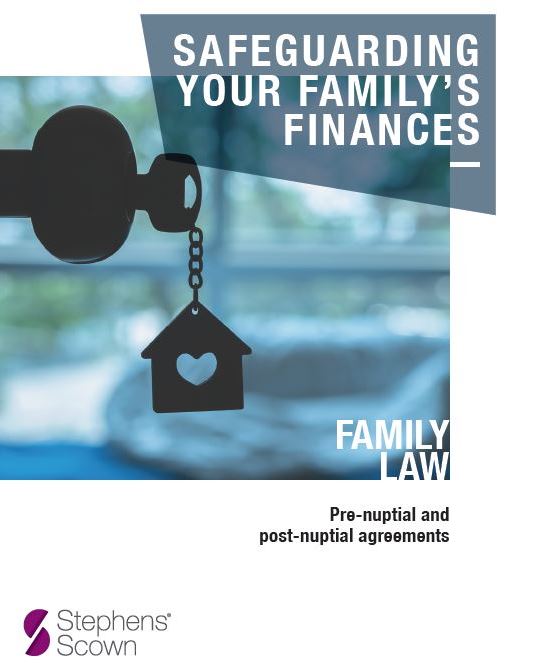Pensions in Divorce
Pensions are often dismissed as future income which may or may not be received, yet they can sometimes be the biggest asset in a marriage.
Pensions can be substantial capital assets, and all have a capital value (known as the cash equivalent value) which can be a vital part of a divorce settlement. Since 2000, the court has had the power to share pensions between spouses on divorce, providing both parties with a tax-efficient and cost-effective way to achieve a ‘clean break’.
Divorce and pension rights
The treatment of pensions on divorce is a vital consideration for every divorcing couple looking to agree a financial settlement. Pensions are often considered separately from non-pension assets and income. It’s important that every divorcing couple with pension interests ensures this specialist area is correctly covered.
Pension interests can have a significant value. They are sometimes the most valuable assets in a divorce. The most common valuation used in divorce proceedings is a Cash Equivalent Transfer Value, also known as a CETV or CEV. This is the theoretical amount of pension credit the pension member would receive at the date of the valuation were they to transfer out of their scheme. Although pensions are most used to provide a retirement income, on divorce the CETV is the core piece of information used to consider the pension position of each of the divorcing spouses.
The court has had the power to share pension arrangements between spouses on divorce. This provides a divorcing couple with a tax-efficient and cost-effective way to divide their pension entitlements as required. This enables the couple to each generate a retirement income, sometimes sourced from a single pension.
In England and Wales, the courts will seek to ensure that the divorcing couple’s pension arrangements meet their respective needs following the divorce. This will include their requirements both prior to and following their retirement. This is most often addressed by working with a Pensions on Divorce Expert (PODE) or an actuary, who will advise on the pension adjustment needed to bring about a defined pension income solution.
Pension sharing is the most common tool used to achieve that outcome, however there are other less common mechanisms that can be deployed to bring about other solutions and navigate around some of the more complicated features of pensions on divorce. We will guide you through the process and advise you on an approach that best suits your situation.

How are pensions split in a divorce?
Whilst each pensions on divorce scenario is different, there are steps often essential to the assessment and division of pensions in every situation.
This will include gathering information on all pensions of which the divorcing couple are members. It will cover off all defined benefit and defined contribution schemes, as well as State Pension entitlements through the completion of a BR19 and BR20 application form. We would assess at this stage whether there are complicating features that would warrant the involvement of a financial advisor.
Having obtained that information, we would evaluate whether it would be sensible to instruct a PODE or actuary to provide pensions advice. This can be necessary if there is any defined benefit element to any of the pension schemes, or any complicated features or requirements. If a pensions expert is instructed, this would most commonly be done on a joint basis with your spouse.
We would work with you to devise a settlement position that includes appropriate provision for the division of your pensions. This might be proposed through pension sharing, pension offsetting, or sometimes a combination of both. It can sometimes be appropriate to look at pension attachment/earmarking orders in the case of foreign pension elements. We would look to settle on agreeable terms with your spouse or their solicitor.
Once the financial order is made by the court, the pension adjustment that has been agreed is implemented. In the case of pension sharing or pension earmarking, this occurs through the pension scheme implementing the order. In the case of offsetting, this occurs through other means.

Pension sharing on divorce
The concept of pension sharing was introduced into English Law through the Welfare Reform and Pensions Act 1999. It operates by transferring a pension credit from the scheme of a pension member (known as the “transferor”) into a separate scheme in the name of the receiving spouse (known as the “transferee”).
As an example, consider Alex and Jamie, who are getting divorced. Alex has a defined benefit pension with a CETV of £500,000. Jamie has a defined contribution scheme with a CETV of £100,000. They agree to appoint a PODE to advise on the pension sharing order that should be made to provide them with equal retirement incomes. They agree this should occur from age 65.
The instructed PODE reports on the percentage of Alex’s pension scheme that should be shared with Jamie to bring about the agreed outcome. Alex and Jamie agree to follow the PODE’s advice, and the recommended percentage is included as part of the overall settlement referred to in the consent order, eventually sent to and approved by the court.
Once approved, the consent order and pension sharing annex are sent to the trustees of Alex’s scheme together with the final divorce order and payment for any implementation fee. The trustee will then implement the pension sharing order, from which point the pension credit will be held in a scheme in Jamie’s sole name. It will be Jamie’s to draw down from and completely independent of Alex.
Divorce and pension legal advice
Pensions on divorce can be a complex area to navigate, with many pitfalls that even some family solicitors can overlook. Achieving the right outcome in those circumstances at a time when you are dealing with the many practical and emotional complications that come with divorce and separation can be difficult without specialist legal advice.
A good specialist pensions on divorce solicitor will advise you on the options available for settlement and, in conjunction with an analysis of the non-pension assets, recommend the outcome that is best suited to provide for your long-term financial security.
Approaching pensions during a divorce without legal advice can lead to costly mistakes and settlements that ultimately prove unfair. Ensure your financial future by consulting one of our specialist family finance solicitors.
Specific areas our team advise upon include:
- Preserving premarital pension accrual
- Pension attachment orders
- Apportionment of final salary pension rights
- Pension offsetting
- Age differential and income gap scenarios
- Claims against overseas pensions
- Claims against UK-based pensions in proceedings based overseas
- Tax and utility arguments
- Pension freedoms
- Career Average Revalued Earnings (CARE) schemes and transitional arrangements
- Armed Forces pension schemes including early departure
- Poor health and impaired life annuities
- Underfunding and the Pension Protect Fund
- Re-employment after retirement

Stephens Scown pension experts
Stephens Scown has been at the forefront of advice on pension sharing since its introduction over 20 years ago. We obtained the first reverse pension sharing order in the country. Members of our team are also contributors to the Pensions Advisory Group report (PAGII), which provides guidance to the legal profession on the treatment of pensions on divorce.
We benefit from well-established links with actuaries, PODEs, and financial professionals who can help devise specific solutions and calculations depending on the type of pension involved and outcome sought.
Chambers and The Legal 500, the two leading independent legal guides, rank our Family Law team in the top tier of family teams in Devon and Cornwall. Your future deserves the best advice.
How can we help you
"*" indicates required fields
By pressing send and providing your details you are agreeing to our Privacy Notice.
Once you submit your enquiry we will forward to the correct legal team to get in touch as soon as possible.
Related Services
- Inherited and Pre-Marital Assets
- Claims Against Trusts
- Interim Maintenance
- Maintenance Agreements
- Financial Provision for Children
Downloads
Related Info Hubs
Team Leader







